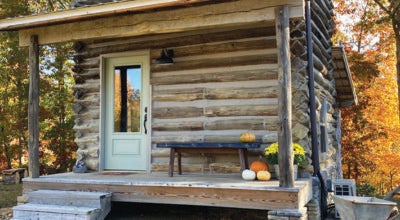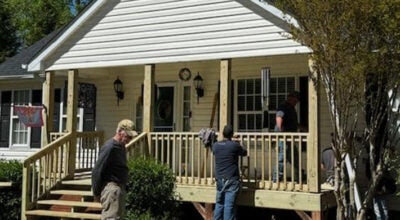The Literary Corner: Renegade Writer’s Guild
Published 9:28 am Thursday, April 1, 2021
|
Getting your Trinity Audio player ready...
|
Famous Settlers in early Davie County
By Linda H. Barnette
The most famous of the early settlers of what is now Davie County was Daniel Boone, son of Squire and Sarah Boone, who now rest at Joppa Cemetery. The elder Boones lived in Pennsylvania and had 11 children. They were acquainted with the Morgan Bryan family, which was probably a major factor in their decision to settle here. Bryan worked for the Conestoga Wagon Company and guided many families south over the years and had brought his own family here. There was also beautiful, fertile land here close to the Yadkin and its streams and tributaries. Another thing that probably brought them here was the marriage of their son, Jonathan Bryan to Mary Carter, whose husband supposedly founded the town of Salisbury.
So the Boones came here in late 1751 or early 1752, and local legend has it that they resided first at the site of what is now Boone’s Cave State Park. The Boone family is said to have actually lived in the big cave on the bluff of the river while they were building their cabin in that area. There is no real evidence or proof that this is true, but there is also no reason to believe that it did not happen. Many spots in that area bear the Boone name, such as the Boone Township and Boone’s Ford.
Not much time passed before Squire bought land in two locations in what is now Davie County, one near Elisha Creek and another, 640-acre tract from Lord Granville about two miles outside of Mocksville in the area of Bear Creek. This property was eventually sold to son Daniel, and then to John, his uncle, and to John Jr., his cousin. Eventually, by deeds dated in 1813, over 200 acres of this land was bought by my Dwiggins ancestor, Daniel. My Grandmother Smith had the original deeds but donated them to the library for safe-keeping.
Perhaps because of fear of Indian attacks or from marauding highwaymen, Squire and Sarah sold all of their property here and moved to Maryland in 1759. However, for whatever the reason, they returned to this area three years later and probably lived in their old home site near Farmington. Squire died in 1765, after which Sarah went to live with her daughter, Mary Boone Bryan, in the Bryan settlement. Sarah died in 1777 age 77.
It is amazing to me to grasp the courage and strength of those early people who left everything to come to a new place and make their homes.
A Bunch of Bunk
By David R. Moore
In 1820 the US House of Representatives debated the admittance of Missouri into the Union as either a free or slave state. The deliberations had been proceeding for over a month, and most members of the 16th Congress were tired of speeches and wanted to proceed with the voting. Felix Walker, the North Carolina congressman who represented Buncombe County, secured the floor and began a long, boring speech. Most of the congressional members walked out, and others shouted for him to sit down. Walker refused and told them that they could also leave as he must “make a speech for Buncombe”; that is, his constituents (and not to Congress).
From Felix Walker’s steadfast actions, a new word entered into the vocabulary: “buncombe.” The word now means ‘talk that is empty’. Over time, “buncombe” morphed into the slang words “bunkum” and “bunk,” both meaning ‘nonsense’. Although we may have heard all of these words used from time to time, the word “debunk” is most often used. Of course, debunk means ‘to expose the false or exaggerated claims, pretensions, glamour, etc. of’.
Forks in the Road
By Stephanie Williams Dean
It’s not uncommon for me to wake up at some time during the night with a revelation from the Holy Spirit. Usually, it’s a word. But last week, I woke up twice – once to the phrase, “fork in the road” and again later, to the single word, “prayer.”
I pondered a fork in the road versus an intersection. I view the two differently – and so does the dictionary.
The dictionary defines an intersection as a point at which two or more things intersect, especially roads, an action of intersecting, or a point common to lines or surfaces that intersect.
However, the dictionary defines fork as the point where something, usually a road, divides into two parts, when a road separates. A fork is a point where a decision must be made before traveling ahead.
Let’s take a closer look at how the road we’re on might fork, and how our decision – to take one road or another – either promises to lead us to a more satisfying outcome or doesn’t.
This dilemma has my name all over it. How many times have I personally reached a fork in the road where I didn’t stop and pray for direction? I forged ahead, making a decision based on emotion or instincts – only to realize too late – I had taken the wrong path. My instincts often lead me in the wrong direction and emotions misguided me.
Do you remember my dreams of both the phrase “fork in the road” and the word “prayer?” When we meet a fork in our road and have decisions to make – we are to pray to God for answers. God’s the best travel guide in the business of answering prayer. He helps keep us on the right path.
Prayer is not only good for major decisions we’re facing, but for all decisions, no matter how small or insignificant we feel they are. Christ keeps us moving in the right direction.
Also, Paul wrote, “Be earnest and disciplined in your prayers.”
Earnest prayer is discerning prayer with a sensibility that allows us to appraise our forks in the road, pray accordingly, and act appropriately.
Taking this one step further – can you see how the Holy Spirit spoke to me in my sleep, guiding me in an area where I need more self-discipline – fewer emotionally driven decisions and more prayerful choices?
We not only have to pray in all matters – but be ready to listen when the Spirit speaks.
•••
For more information on Renegade Writers Guild, visit www.renegadewritersguild.wordpress.com.
•••
Submit a favorite memory of life in Davie County. Story should be typed and not more than 250 words. Please include your name and phone number or email address. RWG retains reprint rights. Email to lhb1@yadtel.net.





